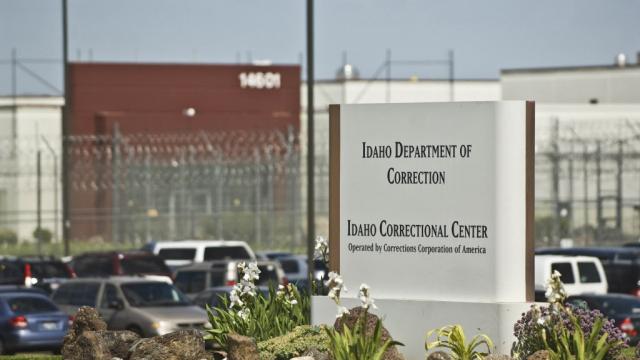
The FBI has launched an investigation into the Corrections Corporation of America (CCA) over the way it runs an Idaho prison that has such a reputation for violence that inmates dub it "Gladiator School."
The Nashville, Tenn.-based CCA has operated Idaho's largest prison for more than a decade, but last year, CCA officials acknowledged it had understaffed the Idaho Correctional Center by thousands of hours in violation of the state contract. CCA also said employees falsified reports to cover up the vacancies. The announcement came after an Associated Press investigation showed CCA sometimes listed guards as working 48 hours straight to meet minimum staffing requirements.
In January, Idaho officials announced the prison may be handed over to state control because of its staffing issues.
This isn’t the first time the CCA, and private prisons in general, have come under fire in Idaho and elsewhere. Rights groups have long held that private prisons are run without sufficient oversight, often leading to increased violence and prisoner maltreatment.
In Idaho, a 2008 state-run study obtained by the American Civil Liberties Union found that there were four times as many prisoner-on-prisoner assaults at the state’s CCA-run prison than at Idaho’s other seven prisons combined.
And a 2010 NPR investigation suggested that CCA won out on state contracts in Arizona because of its close connections to politicians in the state.
Officials and opponents of private prisons have also argued that privately run prisons are inefficient. A 2001 study by the Justice Department, for example, found that “the cost benefits of privatization have not materialized to the extent promised by the private sector.”
Still, despite such findings, the privatization of prisons has continued mostly unimpeded.
CCA’s stock price has doubled in the past 10 years. And as more prisons are built to house people attempting to illegally cross the U.S.-Mexico border, most are being built by private contractors like CCA.
The current FBI case in Idaho also has a storied history that many say is due to CCA’s close ties to legislators there.
The Idaho State Police department was asked to investigate the company last year but didn't. After political pressure mounted, Republican Gov. Butch Otter ordered the police to do so last month. About two weeks later, Democratic state lawmakers asked the FBI to take up the case.
Idaho Department of Correction spokesman Jeff Ray confirmed Friday that the FBI met with department director Brent Reinke on Thursday to inform him about the investigation. Idaho State Police spokeswoman Teresa Baker said her agency was no longer involved with the investigation and that the FBI has taken it over entirely.
"They (the FBI) have other cases that are tied to this one so it worked out better for them to handle it from here," Baker said.
CCA spokesman Steve Owen could not be immediately reached, but Owen has previously said that his company would continue to cooperate with any investigation.
Understaffing at the prison has been the subject of federal lawsuits and a contempt of court action against CCA. The ACLU sued on behalf of inmates at the Idaho Correctional Center in 2010, saying the facility was so violent that inmates called it "Gladiator School" and that understaffing contributed to the high levels of violence there.
In 2012, a Boise law firm sued on behalf of inmates contending that CCA had ceded control to prison gangs so that they could understaff the prison and save money on employee wages, and that the understaffing led to an attack by one prison gang on another group of inmates that left some of them badly injured.
The Department of Justice requested a copy of a forensic audit done for the Idaho Department of Correction earlier this year. That audit showed that CCA understaffed the prison by as much as 26,000 hours in 2012 alone; CCA is strongly contesting those findings. CCA's Owen has said the company believes the audit overestimates the staffing issues by more than a third.
CCA's contract with Idaho was worth about $29 million a year. In February the company agreed to pay Idaho $1 million to settle the understaffing claims.
3 WAYS TO SHOW YOUR SUPPORT
- Log in to post comments

















